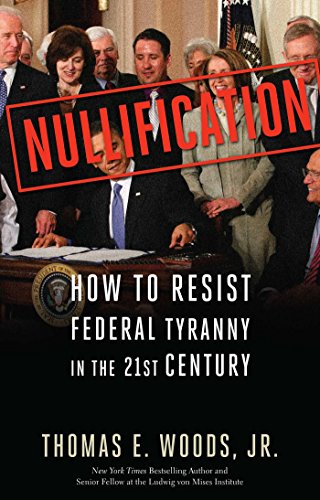Recently by Mark Nestmann: Warning on Moving Precious Metals IntoCanada
“Control food and you control people.” ~ Henry Kissinger, Former Secretary of State
Leave it to Congress to make criminals out of organic farmers and anyone else having anything to do with the production, distribution, or sale of food. Yesterday, the U.S. Senate enacted S-510, the “FDA Food Safety Modernization Act of 2010.”
It’s the equivalent of a USA PATRIOT Act…for food. Yes, for food. And since a companion act in the House of Representatives has already been enacted, the bill will become effective as soon as President Obama signs it.
S. 510 empowers the FDA to regulate every aspect of food production and processing. Nothing is to be exempted…your grandchild’s lemonade stand is probably a “food distribution facility.” So is your backyard organic garden.
 Nullification: How to ...
Best Price: $2.00
Buy New $8.34
(as of 05:25 UTC - Details)
Nullification: How to ...
Best Price: $2.00
Buy New $8.34
(as of 05:25 UTC - Details)
Organic farmers, though, are the most likely target of this bill. For instance, a growing number of consumers purchase raw, unpasteurized milk from dairy farmers. It’s true that this poses a potential health risk. The farmer must apply scrupulous hygienic standards, and also insure cows don’t eat poisonous plants that could contaminate the milk. Pasteurization eliminates most of this risk.
Because of the risks of raw milk, the FDA, the Centers for Disease Control (CDC), and many other organizations have recommended banning its production. And under the authority of this bill, the FDA could issue regulations to do exactly that.
Certainly, problems do exist in our food supply. The CDC estimates that food-born diseases cause 5,000 deaths in the United States annually.
 Direct Citizen Action:...
Best Price: $0.47
Buy New $5.75
(as of 09:05 UTC - Details)
Direct Citizen Action:...
Best Price: $0.47
Buy New $5.75
(as of 09:05 UTC - Details)
However, the vast majority of these deaths come from “factory agriculture” – large-scale agribusiness operations. But, under this “Food PATRIOT Act,” the FDA could force even the smallest family owned farms to follow the same regulations as large-scale food operations.
Another part of this bill effectively outlaws any “unsafe medications.” Taken to its logical conclusion, this provision could extend to dietary supplements and herbal products. Any dietary supplement the FDA hasn’t certified as safe could be banned, or not made available without a doctor’s prescription.
Such a ban is already in effect throughout the EU. Indeed, when I was living in Austria, and received a package of nutritional supplements in the mail, I was hauled before a tribunal and forced to explain (in German!) why I was importing “illegal drugs” into Austria. It turns out that under Austrian law, importing any nutritional supplement containing more than 100% of the recommended daily requirement for any vitamin or mineral is generally illegal.
The FDA Food Safety Modernization Act is billed as a way to safeguard our food supply. But what it actually does is protect the interests of agribusiness against organic farmers, lemonade-toting toddlers, and Vitamin C-guzzling seniors. I don’t have anything against agribusiness or any other business. But, I do object when powerful corporate interests lobby Congress to enact legislation that enriches those interests at the expense of everyone else. And that’s exactly what the act does.
Much depends upon how the FDA chooses to issue regulations to interpret this act. It’s possible that the FDA may choose to sensibly exempt small food producers, organic farmers, and dietary supplements that haven’t been proven harmful from its reach. But don’t count on it.
December 3, 2010
Mark Nestmann is a journalist with more than 20 years of investigative experience and is a charter member of The Sovereign Society's Council of Experts. He has authored over a dozen books and many additional reports on wealth preservation, privacy and offshore investing. Mark serves as president of his own international consulting firm, The Nestmann Group, Ltd. The Nestmann Group provides international wealth preservation services for high-net worth individuals. Mark is an Associate Member of the American Bar Association (member of subcommittee on Foreign Activities of U.S. Taxpayers, Committee on Taxation) and member of the Society of Professional Journalists. In 2005, he was awarded a Masters of Laws (LL.M) degree in international tax law at the Vienna (Austria) University of Economics and Business Administration.





